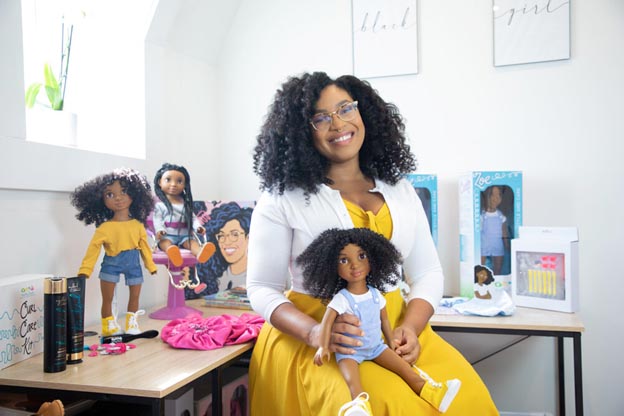Guyanese women who, often against considerable odds, persist in seeking to transform their passion for the art and craft industry into thriving business ventures can draw inspiration from the pursuits of Haitian American entrepreneur Yelitsa Jean-Charles, the founder of the US company, Healthy Roots Dolls, who disclosed recently that her dolls are now sold at the 1,200 Target stores across the United States and are also available online.
Established in 2019, Healthy Roots Dolls creates dolls and story books that seek both to empower young black girls and to help reflect the concept of beauty in diversity. With more than 65 per cent of the world’s population having curly/wavy hair, the advent of Healthy Roots Dolls emerged from a 2016 study that found that only four (4) out of ten (10) girls loved their curls. “Toys impact how we think, act, and perceive ourselves. So when girls can’t find dolls that look like them, it negatively impacts their self-esteem; that’s why we created Zoe, the first Healthy Roots doll,” a promotional write-up from the company states.
Beyond being simply a doll store, Healthy Roots Dolls has been created to help owners embrace their identity. “We go beyond painting a Doll brown. We create an educational play experience with curl care,” an article on the company says.
Over time, the company has produced “a medley of facial features, skin tones and hair textures that can be styled in countless ways.” The company says that its dolls have “multiple interests and aspirations, a concept that exposes young girls to their own unlimited career potential…Our goal is to represent the voices of young girls in the toy industry with products that empower, educate and inspire self-love,” the promotional article further states.
The initial idea of Healthy Roots Dolls reportedly originated during Jean-Charles’ junior year in college when she redesigned Rapunzel, a fictional character who appeared in the Walt Disney Animation Studio’s 50th animated feature film “Tangled”, her long flowing hair being her trademark. Jean-Charles transformed Rapunzel into “a young Brown girl with kinky, curly hair.” Reportedly inspired by her classmates’ views on her Rapunzel creation, she took her idea to Facebook, where she reportedly had eye-opening conversations with her peers. “I realised that many of these women never had a doll that actually looked like them growing up. We didn’t have dolls that had our hair,” she is quoted as saying. Success having been realised over a relatively brief period, Jean-Charles is quoted as saying that “our [the company’s] mission is to bring curl power to the toy aisle with products that reflect the diversity of our reality.”
For her thoughtful and creative endeavours, Jean-Charles has secured a Social Innovation Fellowship from Brown University, a private Ivy League research university in Providence, Rhode Island, and raised more than US$1 million that helped to develop her concept into a prototype.
Innovative ideas that eventually emerge as products in the local creative and cosmetics industries frequently arise out of the creators’ desire to manufacture products that they can connect to their identity and which, particularly in the local skin care industry, have their origins in attempts to add value to the lives of family members.






